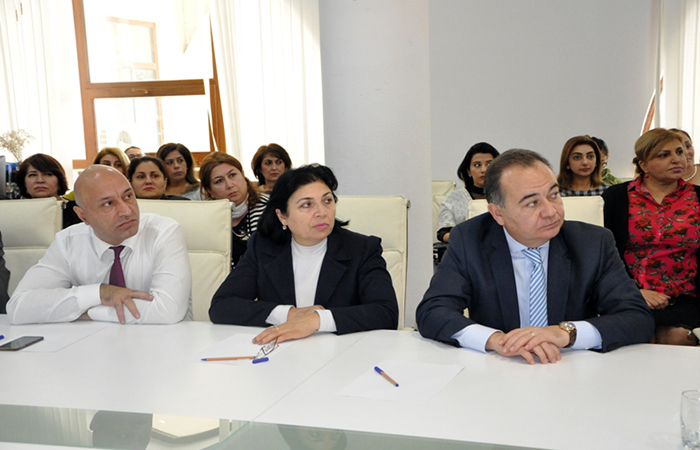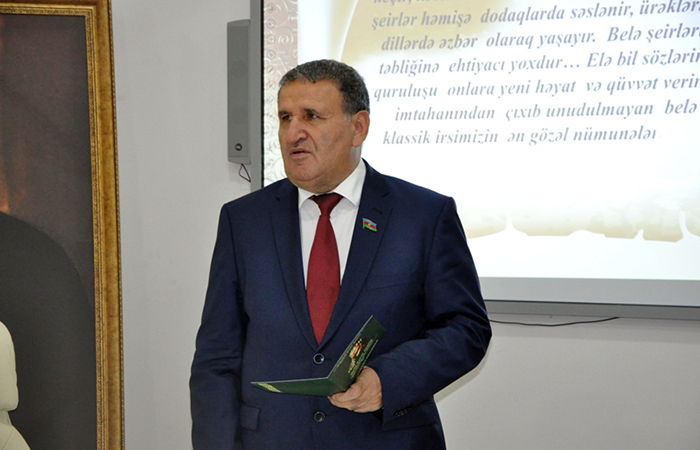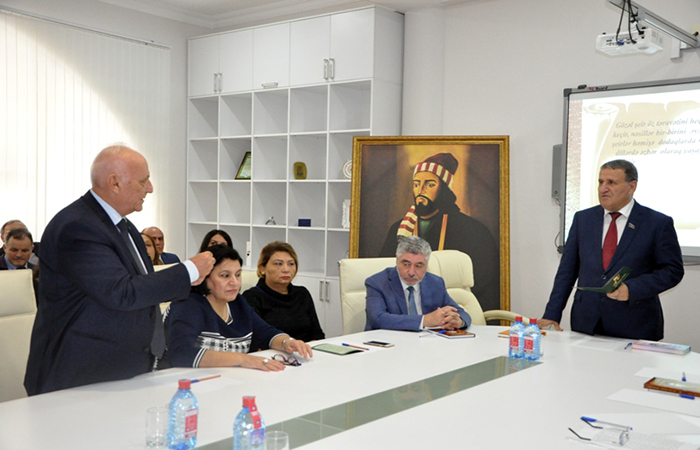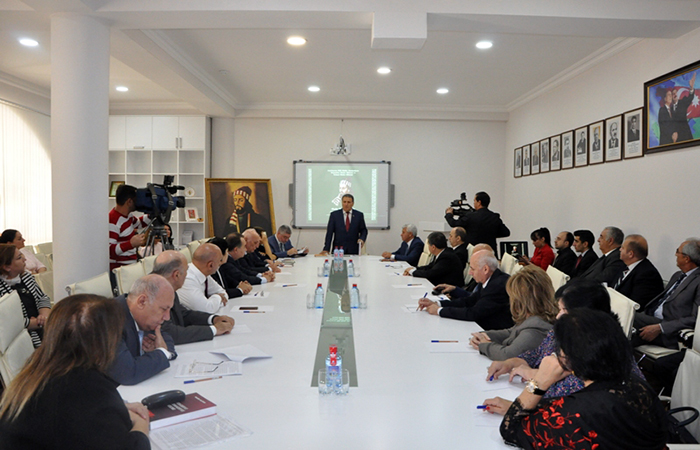- A-
- A
- A+
"Ideals in Molla Panah Vagif's Work and Modernity" a scientific session held
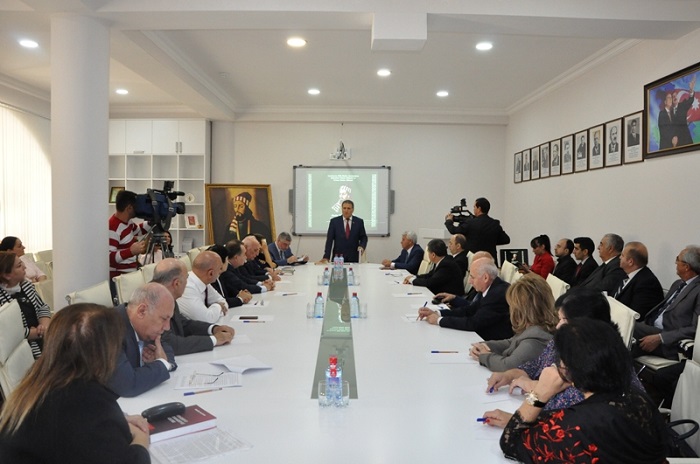
ANAS by the joint organization of the Departments of the Humanitarian and Social Sciences held "Ideals in Molla Panah Vagif's works and modernity" a scientific session dedicated to the 300th anniversary of the great Azerbaijani poet Molla Panah Vagif on October 20.
ANAS Vice-President, Academician Isa Habibbeyli, Academician-Secretary of the Department of Humanitarian Sciences, Academician Teymur Kerimli, cademician-secretary of the Department of Social Sciences, academician Nargiz Akhundova, directors and employees of relevant scientific institutions and other guests attended the event.
Opening the session, Academician Isa Habibbeyli noted that, the event was organized in accordance with the Order of the President of the Republic of Azerbaijan, Ilham Aliyev on "Conducting the 300th anniversary of the great Azerbaijani poet Molla Panah Vagif".
Informing that, name of Molla Panah Vagif was included in to "Program of anniversaries of outstanding personalities and significant events for 2016-2017" UNESCO, Academician added that, this shows how highly valued humanistic values are reflected in the work of the great master of the word, which left indelible traces in the history of the centuries-old rich literature of Azerbaijan.
Academician spoke about the world of Vagif's poetry, his rare creative style, public, political and diplomatic activities, Vagif's capabilities to influence the processes in the region. Vice-President of ANAS emphasized that M.P.Vagif created a literary school with unique traditions, samples of his inimitable poetry had a great influence on the development of Russian literature in a new way.
Having said that, poet is the founder of realistic literature of Azerbaijan of early modern times, the Academician added that he is the most famous representative of Azerbaijani literature of the period after Muhammad Fizuli and Mirza Fatali Akhundzade. Academician Isa Habibbayli noted that the basis of Vagif's poetry was the reflection of the people's life and it is not accidental that he is called a "folk singer".
Then, was demonstrated documentary film "I sing in poetry what life writes in prose", dedicated to the life and Molla Panah Vagif’s activity.
At the session Deputy Director for scientific works of ANAS Literature Institute after Nizami Ganjavi, Doctor of Philology Mammad Aliyev delivered report on "Molla Panah Vagif and Makhtumkuli". The scientist spoke of the usage in the classical poetry from the XVI century on the style of folk poetry and its inherent poetic forms, the gradual expansion of the boundaries of this use and the strengthening of the position of folk poetry in classical literature.
M.Aliyev noted that, thanks to the works of Molla Panah Vagif and Makhtumkuli Fragi, the leading position of poetry in the native language was fully established in literature, the norms of the literary language were enriched and fixed in written literature due to the spoken languages of the Azerbaijani and Turkmen peoples.
At the event was listened scientific report of Deputy Director of ANAS Institute of Manuscripts after Muhammad Fizuli on scientific work, Doctor of Philology, Professor Pasha Kerimov on "Singer of reality and beauty". P.Kerimov noted that, in the work of Molla Panah Vagif the goshma, which came from oral folk literature, was enriched with images from classical poetry, phrases and words from Arabic and Persian languages and the genres of classical poetry approached the genres of oral folk literature, goshma and acquired a nationality. He stressed that, Vagif was familiar with the works of his predecessors, who lived at the beginning of the XVIII century and criticized the social order. The reporter added that Vagif wrote a muhammas with a rediff "I did not see" in response to Murabb with the rediff "I did not see"by Nishat Shirvani, who lived at the end of the XVII - first half of the XVIII century.
At the event was listened scientific report of Deputy Director of the Institute of Architecture and Arts for General Affairs, Ph.D. in Philosophy Khazar Zeynalov, said that, one of the greatest achievements of the fine art of Azerbaijan in the 20th century is the creation of portraits of prominent masters of the word. He said that, a group of outstanding domestic classics artists created portraits of poets-classics and thinkers, masters of the word and pen, who are distinguished by their high artistic content, integrity and perfection of the image. Noting that, among the poets whose portrait was written, M.P.Vagif occupies his place, the speaker added that, his artistic image inspired such prominent artists and sculptors as Mikayil Abdullayev, Jalal Garyagdi, Albert Mustafayev, Ramiz Ismi Gaya and etc.
Then, was listened report of the head of the History of Azerbaijani Handicraft Department of ANAS Institute of History after A.A .Bakikhanov, Doctor of History sciences, Professor Jamal Mustafayev on "Molla Panah Vagif and the foreign policy of the Karabakh khanate". Said that, Molla Panah Vagif was also a prominent statesman, the scientist noted that, his abilities and sharp mind attracted the Karabakh Ibrahim Khalil Khan, Vagif was the chief secretary, interlocutor and chief vizier of the khan.
The speaker said that, Vagif played a significant role in the governance of the Karabakh Khanate, especially in foreign policy issues: "He made a great contribution to the friendly and allied relations between the Karabakh Khanate and Kartli-Kakheti kingdom for a long time. Vagif is the main author of letters addressed to Agha Muhammad Shah Qajar and the commander of the Russian army, General V. Zubov, who in 1796 made a campaign to Azerbaijan. The letter written by Vagif and handed over to V. Zubov by his son Abulfat-aga played an important role in eliminating the tension established between the Russian command and the Karabakh khanate, and did not allow disagreements to develop into war.
Also at the event the employee of the Literature Institute named after Nizami Ganjavi, Doctor of Philology Mahira Guliyeva and others spoke about the life and work of the great poet.
©All rights are reserved. Citing to www.science.gov.az is necessary upon using news.
Similar News
Links
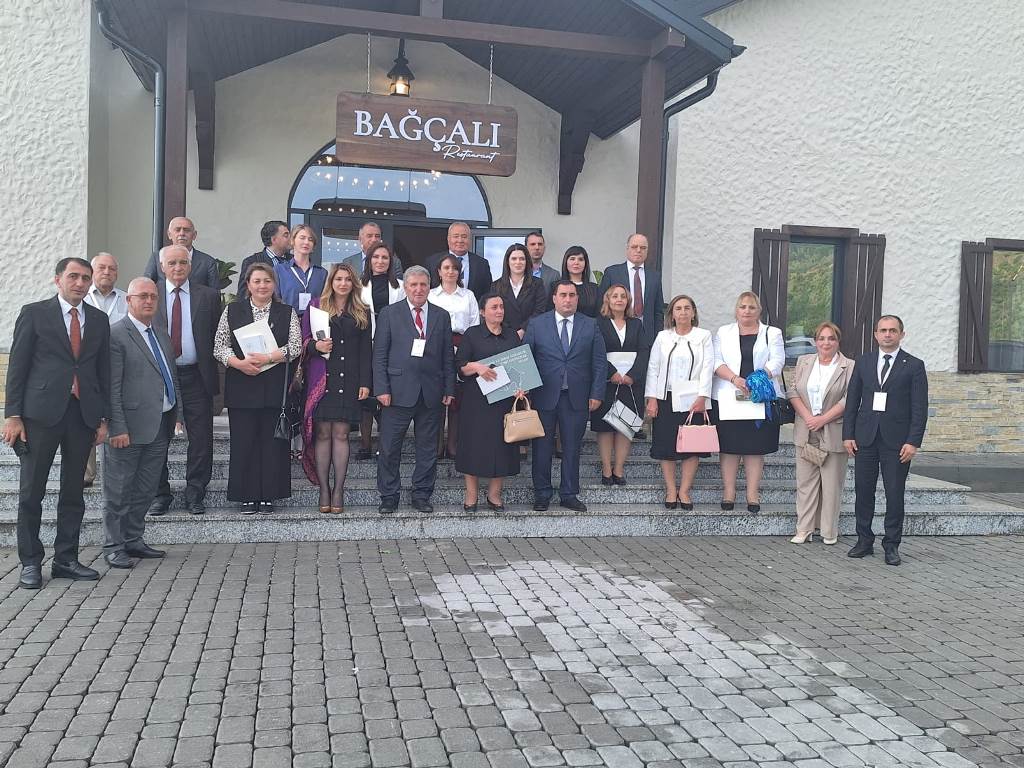

 Elm TV
Elm TV
 Photo
Photo
 Video
Video
